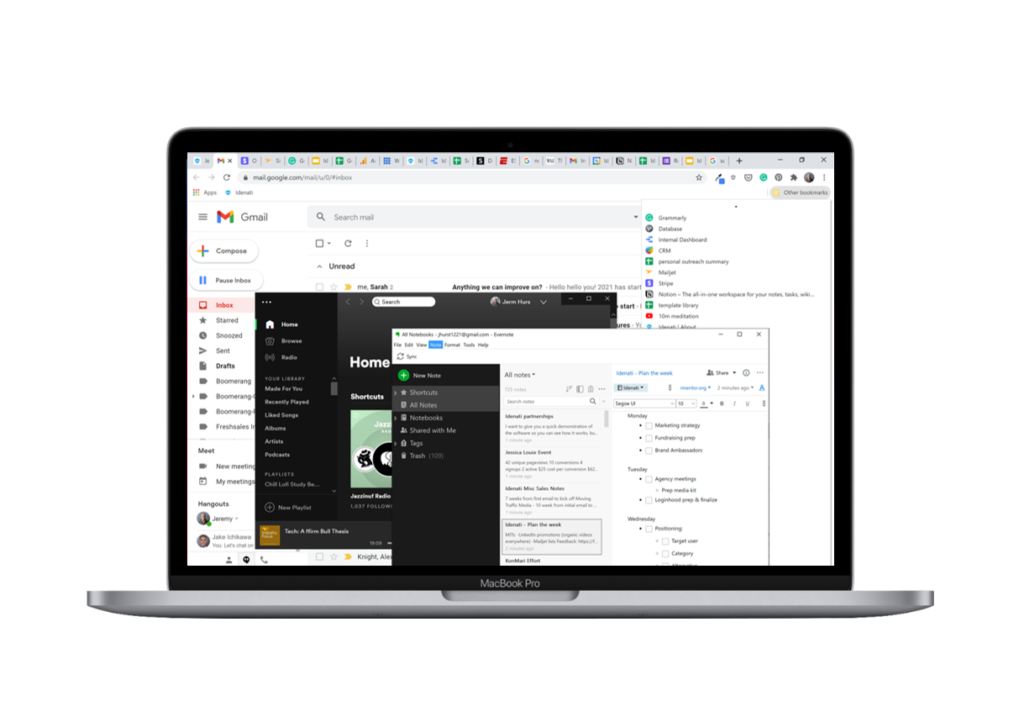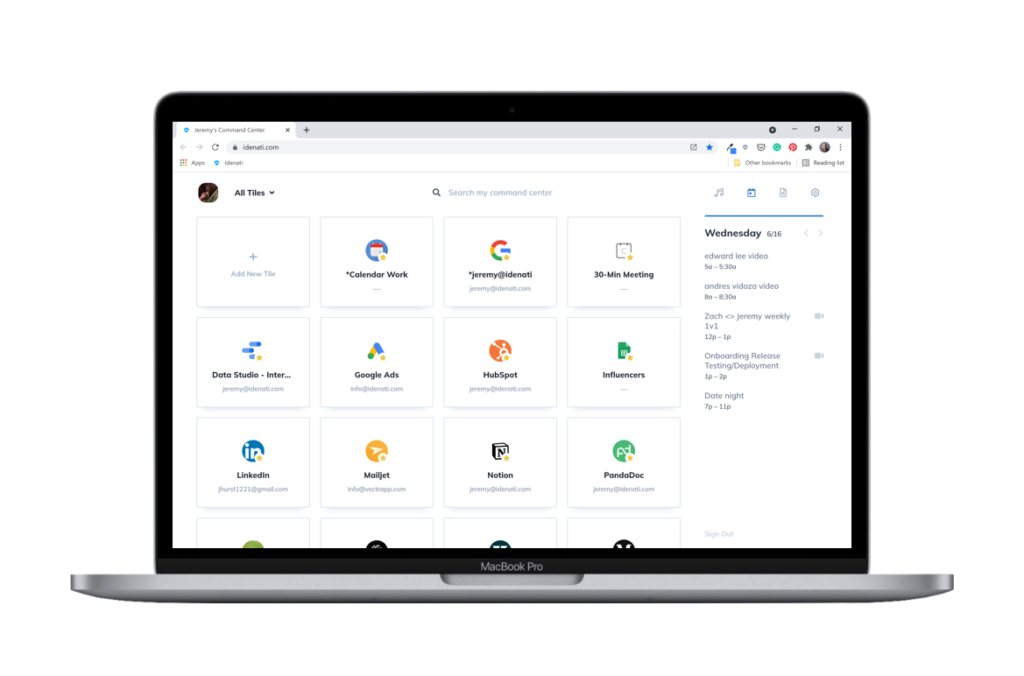Welcome to this edition of our tools for thought series, where we interview founders of companies on a mission to help you live, work, and think better. Jeremy Hurst is the co-founder of a software company called Idenati, started in 2019 as a side project at first.
On the surface, Idenati helps people become more organized online. But Jeremy’s broader idea is that people should be more mindful and intentional about the time they spend online, and about how they live their lives in general. That’s why he describes their software as a trojan horse for a much larger idea: living with intention.
In this interview, we talked about how mindfulness can increase our focus and productivity, the ecology of human experience and the interconnectedness of everything, how to regain control of our daily decisions, how to create positive feedback loops, how to intentionally direct your attention, the importance of balancing online and offline time, and much more. Enjoy the read!
Hi Jeremy, thank you so much for agreeing to this interview. Idenati is such a unique product idea — there hasn’t been a proper attempt at creating an internet homepage in about fifteen year. How did you come up with the idea?
Idenati is the result of a “spiritual” awakening coming into contact with a practical need. Ten years ago, I started exploring meditation and mindfulness. It started as a casual curiosity, but eventually grew into a daily practice. I was blown away by how an awareness of breathing and bodily sensations led to more presence and awareness of how I was living my life more broadly.
In parallel to a growing mindfulness in many areas of life, my online experience often felt quite mindless. When sitting at my computer, I invariably ended up with fifty tabs open and my attention fragmented between many projects and tasks. I knew intellectually that sustained focus was good and multitasking was bad, but it felt like the design of the browser and most websites were intentionally built for distraction.
Ultimately, Idenati started as a way to simplify my experience, to organize all aspects of my digital life in one beautiful and secure place, and unluck deeper levels of focus and productivity in the process.
So it all started with your exploration of mindfulness and meditation…
On the first page of a journal I started in 2010, I wrote: “I have started this journal to facilitate my spiritual growth. I want to engage in a significant amount of self-inquiry. I want the decisions I make to reflect conscious awareness and the right intentions.” I wrote that sentence in response to reading Awakening The Buddha Within. That was my very first introduction to the world of mindfulness and meditation.
It wasn’t until 2017 that I built a daily and disciplined meditation practice. The catalyst was a virtual meditation retreat called Camp Calm. It brought me head-first into contact with the fact that much of my life, most of my decisions, on both a macro and micro scale, were happening outside of my conscious awareness. To regain control, I started with becoming aware of my breath and bodily sensations. From there, the concentric rings of awareness started to spread more widely, and they haven’t stopped spreading to this day.
When we started thinking about Idenati in 2019, the idea was that intense awareness and intentionality should show up throughout the product. Take Idenati Notes for example. It’s missing many things that other note-taking applications have, things like italics, numbers, highlighting, and many other things.
But in building notes, instead of starting with the features that every other app has, we wanted to start from 0. We asked ourselves, what are the bare essentials or most important elements to a note-taking experience? Of course, there are many ways the experience will improve and many things we will add over time, but we want to be intentional along the way.
Sometimes, less is indeed more. You are actually on a mission to declutter the internet. What does that mean exactly?
Think about your iPhone for a second. You’ve likely customized the home screen in order to optimize your life around what you care about. For me, the screen time widget is front and center so that I know how much time I spend looking at my phone. I have deleted investment apps like Robinhood, E-Trade, and Coinbase because I know that checking daily price fluctuations is not aligned to a long-term mindset. I’m very selective about which apps can show the red notification badges.
But on the computer, this is what I was confronted with every day:
Fifty tabs and constant multitasking. Every day began with the mess and clutter of yesterday. It was maddening!
This is how I start my day now:
You can think of Idenati as the next-generation home screen for the internet, a space that you get to customize and optimize around the things that are important to you. This video captures the idea well:
What do you think is the relationship between our online and offline lives? How can we make sure they feed into each other in a positive way, rather than create a negative loop?
I once heard a story about how a plot of land was restored in South Africa. The area had previously been filled with cattle farms, but the farms went bust due to overgrazing and tough terrain. As such, the land was in shambles. That is, until the owners came into contact with a prominent ecologist. The ecologist told the landowners that they must partner with the land if they are to restore it. He showed them how to pack scrub into low points on the land to absorb runoff and abate erosion.
As they did that, grasses began to grow, encouraging wildebeest and waterbuck to return. With those came flocks of birds, furthering the spread of plant life. Eventually, baboons, lions, leopards, rhinos, and elephants all began to thrive. Today, the land is home to the Londo Lozi Wildlife Reserve, one of the most beautiful reserves on earth.
The water, plants, animals, topography, climate, all of it is connected. Over the years, I’ve come to realize that human life is much the same. The organization or disorganization of your home, your mental and physical health, your emotional and spiritual wellbeing, who you surround yourself with, how you spend your time online. It’s all one interconnected system. I call it the ecology of human experience.
In light of the interconnectedness of everything, I find that creating positive feedback loops starts with building a solid foundation for everything else to build upon. For me, that positive foundation is about getting enough sleep, about eating well, exercising, and of course, meditation.
That’s fascinating. Going back to the realm of our online world, how do you think we can become more productive when working online?
I hesitate to give advice on the topic of productivity given the wide disparity of working styles, but I’ll share two things that are helpful for me.
The first is thinking about where and how I start the day. I used to start with email, but as I considered it more deeply, I realized that email put me in a reactive state. My day began in response to the deluge of incoming requests. Today, I start by looking at an empty screen each morning. The first part of that is closing all windows and apps each night and shutting down my computer. The second part has to do with the browser, which is where I spend most of my time. When I open Chrome, Idenati is my home screen. Having planned ahead, I launch only the relevant tile(s) required to dedicate my attention fully to a specific task.
The second is intentionally inserting offline time within online time. I used to fill every offline moment with online consumption. Podcasts while walking the dog, music while working out, email newsletters while on the toilet. But I find that leaving those spaces for thinking, daydreaming, or even a quick meditation, allows me to have better clarity of thought and deeper focus when I’m working online.
We tend to think of an internet homepage as something personal, but Idenati allows users to share tiles with each other. How does it work exactly and what are the benefits?
Collaboration is central to being human. So while Idenati is a consumer product and deeply personal, there are many aspects of the product that lend themselves to collaboration.
Take passwords for example. For my wife and I, our financial lives are deeply intertwined, so it makes sense that we have the ability to share access to banking and investment accounts. On the work front, I need to grant new team members access to certain systems and share helpful resources.
Over time, our users can expect more robust and diverse sharing capabilities that all point in the direction of helping to simplify and enhance their online experience.
Talking about your users, what kind of people use Idenati?
Idenati is for purposeful digital entrepreneurs who value being organized. I’ll break down each part of that sentence.
Purposeful means not just caring about what, but also paying close attention to how and why. Joshua Becker captures the idea well in his definition of minimalism as “the intentional promotion of the things we most value and the removal of anything that distracts us from them.”
Digital entrepreneurs are people creating online businesses. They’re social media influencers, podcasters, bloggers, e-commerce merchants, online course creators, freelancers, and the like. These people rely on an ever-growing number of apps to run their businesses and spend a ton of time in front of computers.
What would success look like for Idenati?
Success for Idenati is a healthier and more secure internet. It’s hundreds of millions or billions of people around the world creating amazing things online and using Idenati as the way to organize and access all of the tools that make that possible.
That sounds amazing. Thank you so much for your time! Where can people learn more about Idenati?
The best place to learn about Idenati is on our website and from our YouTube community.


